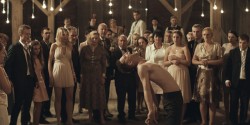Cinema | November 2nd, 2016

Finally winding its way through a limited theatrical release following a 2015 Toronto International Film Festival debut, Marcin Wrona’s “Demon” blends folklore, supernatural mystery, and wedding disaster comedy.
Adapted by Wrona and Pawel Maslona from Piotr Rowicki’s 2008 play “Adherence,” the film starts with plenty of promise, intrigue, and atmosphere, but fails to maintain those qualities through the concluding frame.
As possessed protagonist Piotr, a young man traveling from England to the site of his nuptials in Poland, Itay Tiran locates multiple opportunities to go big. So does the rest of the cast, threading the needle that Wrona uses to stitch together humor and horror.
Piotr and his bride Zaneta (Agnieszka Zulewska) are to receive a rustic, fixer-upper farmhouse belonging to Zaneta’s father Zgmunt (Andrzej Grabowski) as their marriage gift. Unfortunately, on the eve of the ceremony scheduled to take place at Zaneta and Piotr’s home-to-be, the hapless groom accidentally disturbs some human remains, unleashing the ghost of a long-missing young woman. Wrona wrings enough panic and dread from Piotr’s ill-timed discovery to stage plenty of perfectly cringe-worthy and awkward moments at the reception. As the audience learns more about the dybbuk, Piotr’s deteriorating condition is met with a wildly uneven onslaught of behind-the-scenes reactions as Zgmunt labors to keep the vodka flowing and the revelers in the dark about Piotr’s plight.
For a significant stretch, Wrona favors the slapstick, as Piotr is attended by a reluctant priest and a treatment-happy doc who appears to have left his medical ethics in his other suit. Disappointingly, during the escalating chaos, Zaneta is bullied and bossed by her parents far longer than necessary, a component of the narrative that will frustrate viewers hoping and expecting to see a stronger sense of action and advocacy from a character that should have been as central to the story as Piotr. A windy professor provides the flabbergasted in-laws with the demonic possession theory, but Wrona never seems certain about how much Zgmunt’s knowledge of the buried bones should be addressed.
With its allusions to the Holocaust, “Demon” invites more sober discussions regarding the meaning of the restless, disturbed soul belonging to a World War II-era Jew who disappeared just before her own wedding. In some sense, Wrona suggests that Poland continues to be haunted by the tragedies of the past, especially via Zgmunt’s insistence on stoking the party and hiding Piotr from the assembled well-wishers. While Piotr’s fate hangs in the balance, a moody morning-after sequence offers a largely ambiguous resolution.
Viewers will be divided regarding the effectiveness of Wrona’s choices, and some will certainly protest that in one very specific instance “Demon” borrows too closely from “The Shining.” It is certainly possible, however, that Wrona wanted us to feel as disoriented, hungover, and unsatisfied as the pathetic guests stumbling into the light of day.
The great tragedy to accompany “Demon” was the suicide of Wrona less than a week after the movie’s first public screening. At the age of 42 and with a growing list of film and television credits, Wrona ended his life and cut short a promising career.
March 2nd 2026
February 23rd 2026
February 23rd 2026
February 16th 2026
February 16th 2026


_(1)_(1)_(1)_(1)_(1)__293px-wide.jpg)
_(1)_(1)_(1)_(1)_(1)__293px-wide.jpg)
__293px-wide.png)
_(1)__293px-wide.jpg)